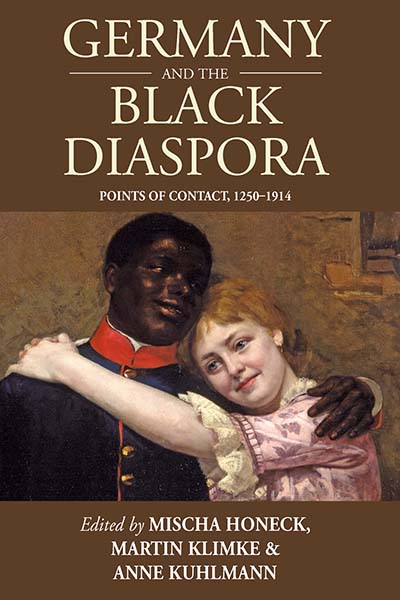Africa in Europe: Studies in Transnational Practice in the Long Twentieth Century
Liverpool University Press
January 2013
304 pages
Illustrations: 8 colour plates, 12 black and white illustrations
234 x 156 mm
Hardback ISBN: 9781846318474
Edited by:
Eve Rosenhaft, Professor of German Historical Studies
University of Liverpool, United Kingdom
Robbie Aitken, Senior Lecturer in History
Sheffield Hallam University, United Kingdom

This volume explores the lives and activities of people of African descent in Europe between the 1880s and the beginning of the twenty-first century. It goes beyond the still-dominant Anglo-American or transatlantic focus of diaspora studies to examine the experiences of black and white Africans, Afro-Caribbeans and African Americans who settled or travelled in Germany, France, Portugal, Italy and the Soviet Union, as well as in Britain. At the same time, while studies of Africans in Europe have tended to focus on the relationship between colonial (or former colonial) subjects and their respective metropolitan nation states, the essays in this volume widen the lens to consider the skills, practices and negotiations called for by other kinds of border-crossing: The subjects of these essays include people moving between European states and state jurisdictions or from the former colony of one state to another place in Europe, African-born colonial settlers returning to the metropolis, migrants conversing across ethnic and cultural boundaries among ‘Africans’, and visitors for whom the face-to-face encounter with European society involves working across the ‘colour line’ and testing the limits of solidarity. Case studies of family life, community-building and politics and cultural production, drawing on original research, illuminate the transformative impact of those journeys and encounters and the forms of ‘transnational practice’ that they have generated. The contributors include specialist scholars in social history, art history, anthropology, cultural studies and literature, as well as a novelist and a filmmaker who reflect on their own experiences of these complex histories and the challenges of narrating them.
Contents
- Acknowledgements
- List of Illustrations
- List of Abbreviations
- List of Contributors
- 1. Introduction / Eve Rosenhaft and Robbie Aitken
- I. Enacting Identity: Individuals, Families and Communities
- 2. Prince Dido of Didotown and ‘Human Zoos’ in Wilhelmine Germany: Strategies for Self-Representation under the Othering Gaze / Albert Gouaffo
- 3. Schwarze Schmach and métissages contemporains: The Politics and Poetics of Mixed Marriage in a Refugee Family / Eve Rosenhaft
- 4. ‘Among them Complicit’? Life and Politics in France’s Black Communities, 1919–1939 / Jennifer Anne Boittin
- 5. ‘In this Metropolis of the World We Must Have a Building Worthy of Our Great People’: Race, Empire and Hospitality in Imperial London, 1931–1948 / Daniel Whittall
- II. Authenticity and Influence: Contexts for Black Cultural Production
- 6. Féral Benga’s Body / James Smalls
- 7. ‘Like Another Planet to the Darker Americans’: Black Cultural Work in 1930s Moscow / S. Ani Mukherji
- 8. ‘Coulibaly’ Cosmopolitanism in Moscow: Mamadou Somé Coulibaly and the Surikov Academy Paintings, 1960s–1970s / Paul R. Davis
- 9. Afro-Italian Literature: From Productive Collaborations to Individual Affirmations / Christopher Hogarth
- III. Post-colonial Belonging
- 10. Of Homecomings and Homesickness: The Question of White Angolans in Post-Colonial Portugal / Cecilie Øien
- 11. Blackness over Europe: Meditations on Culture and Belonging / Donald Martin Carter
- IV. Narratives/Histories
- 12. Middle Passage Blackness and its Diasporic Discontents: The Case for a Post-War Epistemology / Michelle M. Wright
- 13. Black and German: Filming Black History and Experience / John Sealey
- 14. Excavating Diaspora: An Interview Discussing Elleke Boehmer’s Novel Nile Baby / John Masterson with Elleke Boehmer
- 15. Afterword / Susan Dabney Pennybacker
- Bibliography
- Index


